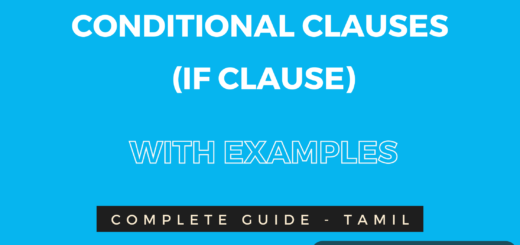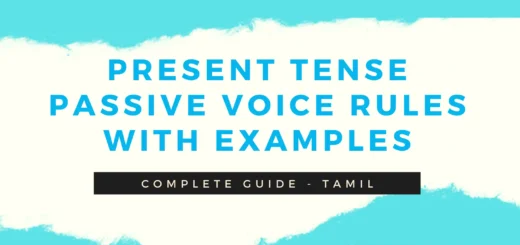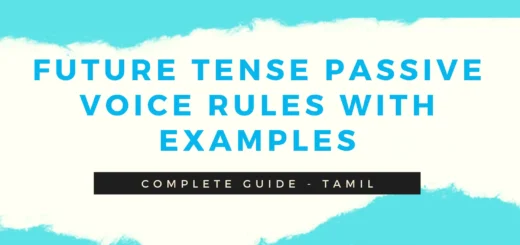Active and Passive voice in Tamil

Active voice in Tamil
active voice ஐ தமிழில் செய்வினை என அழைக்கப்படும். இதுவும் tense இல் உள்ள வாக்கிய அமைப்பும் ஒன்று ஆகும். ஆம், இதில் subject ஆனது ஆரம்பத்தில் வரும். வினைச்சொல்லானது காலத்தை பொறுத்து மாறும்.
Active voice செய்வினை
ஒரு வாக்கியத்தில் எழுவாய் (subject) ஆரம்பத்திலேயே வருமாயின் அது Active voice (செய்வினை) ஆகும். மேலும் வாக்கியத்தில் வினைச் சொல்லானது அதன் காலத்திற்கு ஏற்ப மாறுபடும்.
Example
I read a novel.
நான் ஒரு நாவல் படிக்கிறேன்.
இதனை நாம் tense எனவும் கூறுவோம். அதாவது active voice வாக்கியங்கள் மற்றும் tense வாக்கியங்கள் ஒன்றே ஆகும்.
அனைத்து வகை tense பற்றி அறிய
All 4 past tenses in Tamil with examples
Passive voice in Tamil
Passive voice ஐ தமிழில் செயப்பாட்டு வினை என அழைக்கப்படும்.
ஒரு வாக்கியத்தில் செயப்படுபொருள் (object) ஆரம்பத்தில் வந்து அதன் வினைசொல்லானது past participle ஆக இருக்குமாயின் அது Passive voice (செயப்பாட்டு வினை) ஆகும்.
அனைத்து செய்திகள், செய்திதாள்கள், ஆங்கில வானொலிகள், பாட புத்தகங்கள் என அனைத்து இடங்களிலும் இந்த passive voice பெரும்பங்கு வகிக்கிறது.
Example
A book is read by me.
ஒரு புத்தகமானது என்னால் படிக்கப்படுகிறது.
Active voice மற்றும் tense ஒன்றே ஆகும். tense இல் மொத்தம் 12 வகை உள்ளது. அவற்றைப் பற்றி அறிந்து கொள்ள இங்கே கிளிக் செய்யவும்.
கீழ்க்கண்ட tense களை மட்டுமே நம்மால் செயப்பாட்டு வினை (passive voice) வாக்கியமாக மாற்ற முடியும். அவையாவன,
- The Simple present tense.
- The simple present continuous tense.
- The present perfect tense.
- The simple past tense.
- The past continuous tense.
- The past perfect tense.
- The simple future tense.
- The future perfect tense.
கீழே உள்ள நான்கு tense களை நம்மால் செயப்பாட்டு வினையாக மற்ற இயலாது.
- The present perfect continuous tense.
- The past perfect continuous tense.
- The future continuous tense.
- The future perfect continuous tense.
நாம் செய்வினையில் இருந்து செயப்பாட்டு வினை வாக்கியமாக மாற்ற சில விதி முறைகளை பின்பற்ற வேண்டும். அவை என்னென்னவென்று இங்கு காண்போம்.
Active and passive voice formulas for the simple present tense
The simple present tense active voice formula
| The Simple present tense | Active voice form |
| The Simple present tense form | Subject + present verb + s / es + object |
| The Simple present tense interrogative form | Do / Does + subject + present verb + object? |
| The Simple present tense negative form | Subject + do not / does not + present verb + object. |
The simple present tense passive voice formula
| The Simple present tense | passive voice form |
| The Simple present tense form | Object + am / is / are + past participle + by + subject. |
| The Simple present tense interrogative form | Am / Is / Are + object + past participle + by + subject ? |
| The Simple present tense negative form | Object + am not / is not / are not + past participle + by + subject. |
Examples of Active & passive voice rules for the simple present tense
1. Active voice: I eat an apple – நான் ஒரு ஆப்பிள் சாப்பிடுகிறேன்.
Passive voice: An apple is eaten by me. – ஆப்பிளானது என்னால் சாப்பிடப்படுகிறது.
2. A cow eats grass. – மாடு புல்லை உண்கிறது.
Grass is eaten by a cow. – புல்லானது மாடால் உண்ணப்படுகிறது.
present tense இன் அனைத்து வகை வாக்கியங்களையும் active voice இல் இருந்து passive voice க்கு எப்படி மாற்றுவது என்பது பற்றி விரிவாக ஒவ்வொரு steps உம் குறிப்பிட்டு எடுத்துக்காட்டுகளுடன் விளக்கப்பட்டுள்ளது. அதனைக் காண
Present tense passive voice rules with examples in Tamil
Active and passive voice formulas for the present continuous tense
The present continuous tense active voice formula
| The present continuous tense | Active voice form |
| The present continuous tense | Subject + am / is / are + present participle + object |
| The present continuous tense interrogative form | Am / is / are + subject + present participle + object? |
| The present continuous tense negative form | Subject + am not / is not / are not + present participle + object. |
The present continuous tense passive voice formula
| The present continuous tense | Passive voice form |
| The present continuous tense | Object + am / is / are + being + past participle + by + subject. |
| The present continuous tense interrogative form | Am / is / are + Object + being + past participle + by + subject ? |
| The present continuous tense negative form | Object + am not / is not / are not + past participle + by + subject. |
Examples.
1. I am watching a movie. – நான் ஒரு திரைப்படம் பார்த்துகொண்டு இருக்கிறேன்.
A movie is being watched by me. – ஒரு திரைப்படமானது என்னால் பார்க்கப்படுகிறது.
2. She is preparing lunch. – அவள் மதிய உணவு தயார் செய்கிறாள்.
Lunch is being prepared by her. – மதிய உணவானது அவளால் தயாரிக்கப்படுகிறது.
Active and passive voice formulas for the present perfect tense
The present perfect tense active voice formula
| the present perfect tense | Active voice form |
| the present perfect tense | Subject + have / has + past participle + object |
| the present perfect tense interrogative form | Have / has + subject + past participle + object? |
| the present perfect tense negative form | Subject + have not / has not + past participle + object. |
The present perfect tense passive voice formula
| the present perfect tense | Passive voice form |
| the present perfect tense | Object + have / has + been + past participle + by + subject. |
| the present perfect tense interrogative form | Have / has + Object + been + past participle + by + subject ? |
| the present perfect tense negative form | Object + have not / has not + been + past participle + by + subject. |
Examples
1. We have seen this series. – இந்த தொடரை நாங்கள் பார்த்தோம்.
This series has been seen by us. – இந்த தொடரானது எங்களால் பார்க்கப்பட்டது.
2. They have made a mess in the hall. – அவர்கள் அறையை அசுத்தமாக்கி வைத்துள்ளனர்.
A mess in the hall has been made by them. – அறை அசுத்தமானது அவர்களால் ஏற்படுத்தப்பட்டது.
Active and passive voice formulas for the simple past tense
The simple past tense active voice formula
| the simple past tense | Active voice form |
| the simple past tense | Subject + past verb + object |
| the simple past tense interrogative form | Did + subject + present verb + object? |
| the simple past tense negative form | Subject + did not + present verb + object. |
The simple past tense passive voice formula
| the simple past tense | Passive voice form |
| the simple past tense | Object +was / were + past participle + by + subject. |
| the simple past tense interrogative form | Was / were + Object + past participle + by + subject ? |
| the simple past tense negative form | Object + was not / were not + past participle + by + subject. |
Examples
1. She ate an apple. – அவள் ஒரு ஆப்பிளை சாப்பிட்டாள்.
An apple was eaten by her. – ஒரு ஆப்பிளானது அவளால் சாப்பிடப்பட்டது.
2. Rajan played the music. – ராஜன் இசை அமைத்தான்.
The music was played by Rajan. – இசை ராஜனால் அமைக்கப்பட்டது.
Past tense இன் அனைத்து வகைகளையும் active voice இல் இருந்து passive voice க்கு எப்படி மாற்றுவது என்பது பற்றி ஒவ்வொரு steps உம் குறிப்பிட்டு எடுத்துக்காட்டுகளுடன் விரிவாக விளக்கப்பட்டுள்ளது. அதனைக் படிக்க கீழே உள்ளதை காணவும்.
Past tense passive voice rules with examples in Tamil
Active and passive voice formulas for the past continuous tense
The past continuous tense active voice formula
| the past continuous tense | Active voice form |
| the past continuous tense | Subject + was / were + present participle + object |
| the past continuous tense interrogative form | Was / were + subject + present participle + object? |
| the past continuous tense negative form | Subject + was not / were not + present participle + object. |
The Past continuous tense passive voice formula
| the past continuous tense | Passive voice form |
| the past continuous tense | Object + was / were + being + past participle + by + subject. |
| the past continuous tense interrogative form | Was / were + Object + being + past participle + by + subject ? |
| the past continuous tense negative form | Object + was not / were not + past participle + by + subject. |
Examples
1. She was praying to God. – அவள் கடவுளிடம் பிராத்தனை செய்து கொண்டு இருந்தாள்.
God was being prayed to by her. – கடவுள் அவளால் பிராத்தனை செய்யப்பட்டார்.
2. I was not following him. – நான் அவனை பின்தொடரவில்லை .
He was not being followed by me.- அவனை என்னால் பின்தொடரமுடியவில்லை.
Active and passive voice formulas for the past perfect tense
The past perfect tense active voice formula
| the past perfect tense | Active voice form |
| the past perfect tense | Subject + had + past participle + object |
| the past perfect tense interrogative form | Had + subject + past participle + object? |
| the past perfect tense negative form | Subject + had not + past participle + object. |
The past perfect tense passive voice formula
| the past perfect tense | Passive voice form |
| the past perfect tense | Object + had + been + past participle + by + subject. |
| the past perfect tense interrogative form | had + Object + been + past participle + by + subject ? |
| the past perfect tense negative form | Object + had not + been + past participle + by + subject. |
Examples
1. I had just completed the task. – நான் பணியை முடித்திருந்தேன்.
The task had been completed by me. – பணியானது என்னால் முடிக்கப்பட்டது.
2. She had reached the target. – அவள் இலக்கை அடைந்தாள்.
The target had been reached by her. – இலக்கானது அவளால் அடையப்பட்டது.
Active and passive voice formulas for the simple future tense
The simple future tense active voice formula
| the Simple future tense | Active voice form |
| the Simple future tense | Subject + shall / will + present verb + object |
| the Simple future tense interrogative form | Shall / will + subject + present verb + object? |
| the Simple future tense negative form | Subject + shall not / will not + present verb + object. |
The simple future tense passive voice formula
| the Simple future tense | Passive voice form |
| the Simple future tense | Object + shall be / will be + past participle + by + subject. |
| the Simple future tense interrogative form | Shall / will + Object + be + past participle + by + subject ? |
| the Simple future tense negative form | Object + shall not be / will not be + past participle + by + subject. |
Examples
1. Will she play this match? – அவள் இந்த போட்டியில் விளையாடுவாளா?
Will this match be played by her? – இந்த போட்டியில் அவளால் விளையாட முடியுமா?
2. We will see you. – நாங்கள் உங்களை பார்ப்போம்.
You will be seen by us. – நீங்கள் எங்களால் பார்க்கப்படுவீர்கள்.
Active and passive voice formulas for the future perfect tense
The Future perfect tense active voice formula
| the future perfect tense | Active voice form |
| the future perfect tense | Subject + shall have / will have + past participle + object |
| the future perfect tense interrogative form | Shall / will + subject + have + past participle + object? |
| the future perfect tense negative form | Subject + shall have not / will have not + past participle + object. |
The future perfect tense passive voice formula
| the future perfect tense | Active voice form |
| the future perfect tense | Object + shall have been / will have been + past participle + by + subject. |
| the future perfect tense interrogative form | Shall / will + Object + have + been + past participle + by + subject ? |
| the future perfect tense negative form | Object + shall have not been / will have not been + past participle + by + subject. |
Examples
1. Australia will have won the toss. – ஆஸ்ட்ரேலியா டாசை வென்று இருக்கும்.
The toss will have been won by Australia. – டாசானது ஆஸ்ட்ரேலியாவால் வெல்லப்பட்டு இருக்கும்.
2. It will have made a noise. – அது ஒலியை ஏற்படுத்தி இருக்கும்.
A noise will have been made by it. – ஒலியானது அதுவால் ஏற்படுத்தப்பட்டு இருக்கும்.
இந்த இரண்டு வகை future tenses ஐ எப்படி active இல் இருந்து passive voice ஆக மாற்றுவது என்பதை step by step ஆக எடுத்துக்காட்டுகளுடன் விரிவாக விளக்கப்பட்டுள்ளது. அதனை படித்து பயன்பெறவும்.
Future tense passive voice rules with examples in Tamil
Active voice pronouns – passive voice pronouns
| Active voice pronouns | Passive voice pronouns |
| I | me |
| We | us |
| You | you |
| They | them |
| He | Him |
| She | her |
| It | it |
| Name | name |
Pronouns பற்றி முழுமையாக அறிந்து கொள்ள இதை படிக்கவும்.
Pronoun (பிரதிப் பெயர்ச்சொல்) & it types in Tamil with examples
If clause, Modal auxiliary verb, auxiliary verb, Prefix & suffix பற்றி அறிய
Conditional Clauses If Clauses in Tamil With Examples
Modal Auxiliary verbs (மாதிரி துணை வினைச்சொற்கள்) in Tamil
Conclusion
நாம் இங்கு active மற்றும் passive voice என்றால் என்ன, அவற்றின் வகைகள் என்ன, எங்கு எவ்வாறு காலத்தை பொறுத்து active voice மாறும், passive voice எப்படி அமைப்பு இருக்கும் இனத்தை நாம் எடுத்துக்காட்டுகளுடன் தெளிவாக விளக்கியுள்ளோம். இந்த பதிவின் மூலம் active voice மற்றும் passive voice பற்றிய அடிப்படை புரிதல் கிடைத்திருக்கும் என நம்புகிறேன்.
உங்களுடைய கருத்துக்களை comments இல் பதிவு செய்யவும். இது எங்களுக்கு மேலும் இது போல பல பதிவுகளை எழுத உதவியாய் இருக்கும்.
எதேனும் சந்தேகங்கள் இருப்பின் அதனை comment இல் பதிவிடுங்கள். உங்கள் சந்தேகங்களை தீர்க்க ஆர்வமாக உள்ளோம்.
நன்றி! வாழ்த்துக்களும் அன்புகளும்!




Clear satisfied